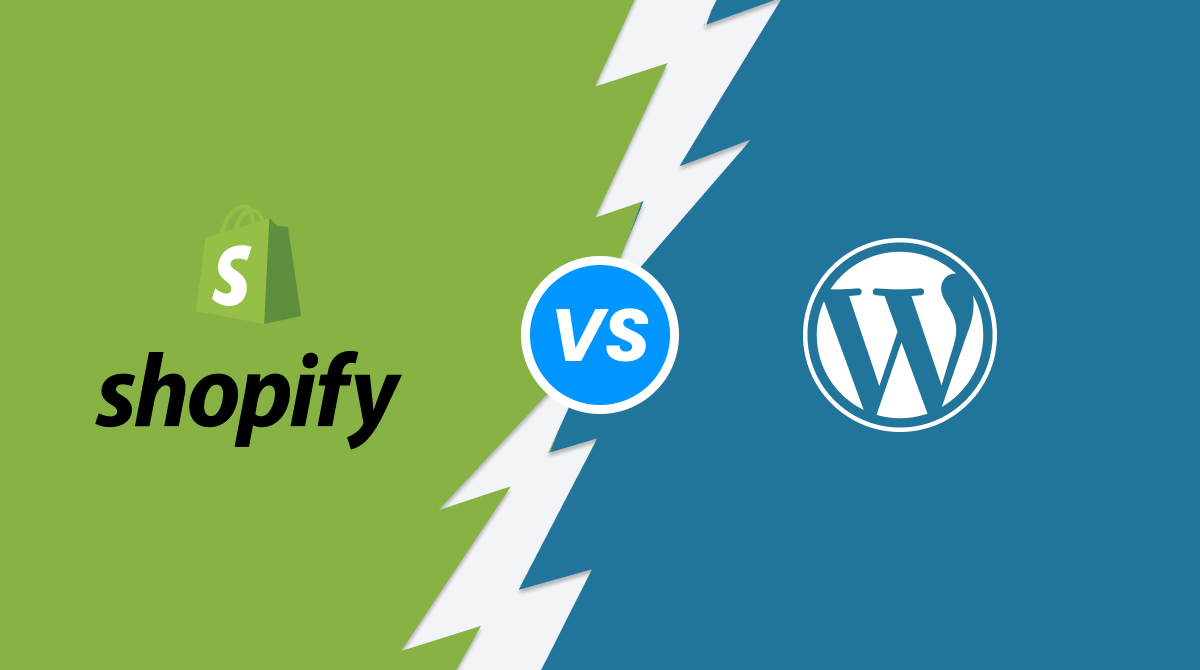When you’re looking into the world of ecommerce, it’s important to pick the right platform around which to build your site. If you choose the wrong one, then customers might have a harder time buying products or navigating your store, and that’ll lead to reduced conversions and lower profits for you. It really is that important!
Broadly speaking, there are two major players in the world of ecommerce platforms: Shopify and WordPress. Shopify is built specifically for ecommerce sites, while WordPress is a more generalist affair that works for all kinds of websites, including ecommerce. So, which one is best? Which one should you opt for if you’re building an ecommerce venture? Here’s our rundown of the pros and cons of Shopify and WordPress for ecommerce!
Shopify is intended for ecommerce
The first checkmark against Shopify’s name in this battle is that Shopify has been constructed specifically for the purpose of enabling and hosting ecommerce sites. Where WordPress has blogging and other site types in mind, Shopify was created for ecommerce businesses. As such, if you’re looking to start an ecommerce venture or you want to move your current business onto a new platform, it’s difficult not to recommend Shopify, because it was created for you.
WordPress is more customisable
Thanks to its smorgasbord of plugins and addons, WordPress is infinitely customisable. While you can customise your Shopify experience to a degree, WordPress is so modular that if you’ve got an out-of-the-box idea that might not work with a more regimented platform, you definitely want to aim for WordPress. Of course, there are ecommerce best practices that it’s a good idea to follow, but if you think you have a better idea of how things should go, then WordPress is the way to go.
Shopify will create your site for you
Like Squarespace, Wix, or other website builders, Shopify will actually walk you through the website creation and customisation process. This means that if you have little to no web design expertise (and hey, we’re not judging), Shopify will be a massive help for you. This will allow you to get on with the important part of ecommerce, which is to say selling your products and making sure you’re making enough of a profit to make yourself and anyone else invested in the business happy!
WordPress has a massive community
This isn’t necessarily a point against Shopify, but rather a point in favour of both, with a slight preference for WordPress. If you’re looking to get something done in the world of WordPress, you’ll almost certainly find helpful documentation and information online. Someone has been in the same situation as you before, and they’ve likely created a tutorial to help you with whatever you’re trying to achieve. WordPress is great if you want to feel like you’re part of a wider web community.
Shopify charges for payments
One of the biggest drawbacks of Shopify is that you need to use its proprietary Shopify Payments system if you want to dodge extra fees on top of your transactions. Using Shopify Payments will bypass these fees, but you may not want to use that system for whatever reason, so this is something to bear in mind. Of course, this won’t be a problem if you don’t mind what payment system you implement on your ecommerce site, but if you have ideas about this element of your business, Shopify wants you to pay for them.
WordPress leaves you to sort out hosting and other things yourself
Shopify is an all-in-one, bespoke solution for ecommerce platforms, which means you won’t need to worry about hosting or security. The platform takes care of all of that for you. WordPress, however, is intended for those who want to be more independent, and that means you’ll need to look after your own web hosting and security. It’s not too difficult to find and implement these things, but if you’re really looking to completely minimise the amount of hassle you have to engage with for your ecommerce business, WordPress likely isn’t for you.
Shopify has a surprising number of plugins
While you might have heard that WordPress has a variety of plugins available, many of which are also great for ecommerce SEO, the same is actually true of Shopify as well. You’ll find a host of apps available via the platform’s own app store, adding functionality like better wishlists, extra security features, and much more. If you’re not happy with the baseline Shopify experience and you want to change it to suit your own needs better, then you might want to take a virtual stroll through the surprisingly well-equipped Shopify app store.
WordPress lets you do more than ecommerce
This might not be relevant to you depending on your personal needs, but WordPress is much better if you’re intending to do more with your website than just ecommerce. While Shopify is great for selling products and services, it doesn’t perform as well as WordPress when it comes to building an all-purpose website with multiple functionalities. If you want additional features on your site, then WordPress is probably the standard you want to opt for.
We hope this breakdown of Shopify vs WordPress has been helpful for deciding which of the two you should use for your ecommerce site! For most ecommerce business owners, Shopify’s range of features and powerful sales tools will almost certainly do the trick, but if you’re looking to break open the box and get technical, WordPress is the platform for you.


